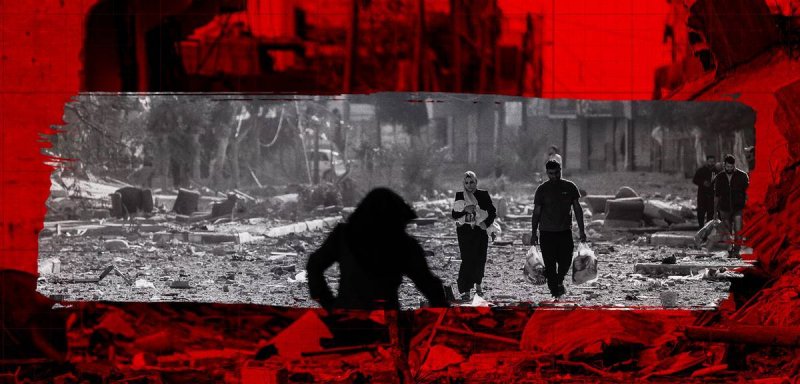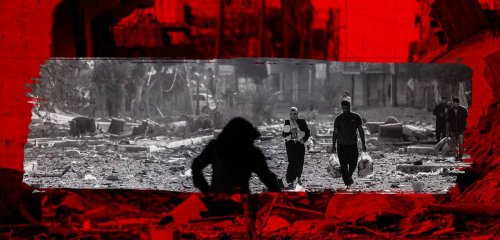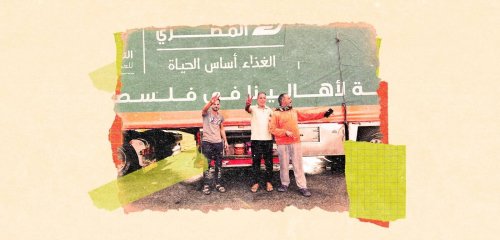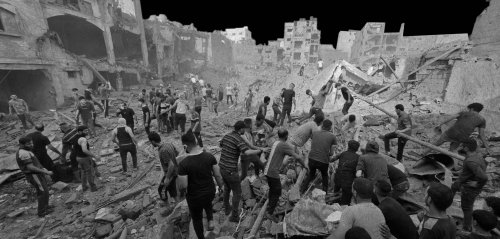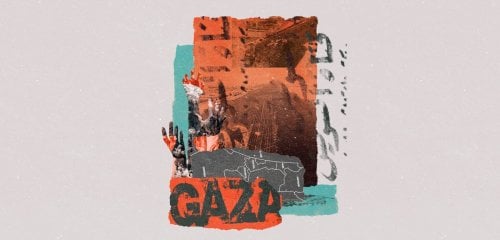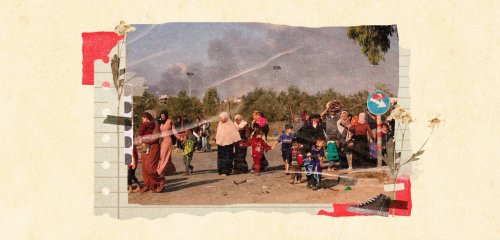Between the call to eliminate the people of Gaza or displace them out of the besieged strip, the Israeli war machine seems to be mostly following the former path, according to researcher Eliyahu Yossian, who has been dubbed “the new star of this war” by Israeli media: "You have to enter Gaza at the height of brutality, with the aim of revenge, zero morality, maximum corpses," without closing the door to the second path. Israeli newspapers report that the government is preparing a proposal to present to the World Bank, including erasing Egypt's debts in exchange for accommodating refugees from Gaza.
Furthermore, Israeli Prime Minister Benjamin Netanyahu has sought support from some global leaders to pressure Egyptian President Abdel Fattah al-Sisi into accepting this plan, saying it is the "best solution", according to the "Yedioth Ahronoth" newspaper.
However, according to the Financial Times, major European countries like France, Germany, and the UK have rejected these proposals, deeming them "unrealistic".
As per the newspaper, one Western diplomat reported that "Netanyahu confirmed that the solution is for the Egyptians to take in Gaza's residents, at least during the war," without the matter "being given serious consideration, because the Egyptian position was and still is very clear; that they won't do it." Another Western diplomat suggested that "some European leaders believe that the pressure resulting from Israel's ongoing attack on Gaza, combined with the pressure on Egypt, might eventually lead to a change in their stance and push them to agree."
In his opinion, "Now is the time to put increased pressure on the Egyptians to agree". However, according to the Financial Times, European Union leaders ultimately agreed that "Egypt’s role should be the delivery of humanitarian aid, as the Rafah crossing into the Sinai region is currently the only route for aid to enter the besieged Gaza Strip, but that Egypt is not obligated to accept an influx of refugees."
"The goal of the war isn't to eliminate Hamas, as Israeli leaders claim, but to displace Gazans to Sinai, and the people of the West Bank to Jordan, to create a pure Jewish state, the dream of the far-right majority in Israel"—political expert Burhan Ghalioun
However, despite increasing pressures, President Sisi firmly rejected "any attempt to stamp out the Palestinian cause through military means or through the forced displacement of Palestinians from their lands, which would come at the expense of the countries in the region." He suggested moving them to the Negev rather than Sinai, if it really is a temporary matter, as Israel claims.
In a contentious move, Tel Aviv had ordered the residents of Gaza City to evacuate and head south in anticipation of its impending invasion of the strip. They made it clear that "reentry into Gaza City will not be allowed unless an official statement permits it", a decision that the United Nations confirmed affects around 1.1 million people, while raising alarms about its "devastating consequences".
"The primary goal of the war is not to eliminate Hamas, as Israeli leaders claim. Rather, it's part of a grander strategy to displace the population of Gaza to Sinai, and subsequently displace the people of the West Bank to Jordan, in order to create a pure Jewish state, the dream of the extremist right-wing that has become the majority in Israel," according to political sociology professor at Sorbonne University, Burhan Ghalioun.
Ghalioun underscores that "ethnic cleansing and mass population displacement has remained a core objective for Israel since its inception. That is why all Israeli governments consistently reject any negotiations concerning the establishment of a Palestinian state as outlined in UN and international resolutions. They've actively undermined peace negotiations since the Oslo Accords of 1991, refusing to entertain discussions regarding the return of refugees, while maintaining the Gaza blockade, and subjecting Palestinians, who have become citizens in Israel, to treatment that diminishes their dignity."
In this context, Ghalioun emphasizes to Raseef22 that "Israel has turned into an apartheid state in every sense of the word, in stark contrast to becoming a European-style democratic state, as it had hoped for or promoted."
"Ethnic cleansing has been a primary goal for Israel since its inception. That's why it consistently rejects negotiations over the establishment of a Palestinian state as outlined in UN resolutions, while actively undermining peace negotiations since 1991"
'Tent cities'
In a controversial statement, former Israeli Deputy Foreign Minister Danny Ayalon said, "This was thought out.. There is a huge expanse, almost endless space in the Sinai desert, just on the other side of Gaza. The idea is – and this is not the first time it will be done – the idea is for them (the Palestinians) to leave the Gaza Strip, into the open areas where we and the international community will prepare the infrastructure, you know, tent cities, with food and water.. This is the idea. Now Egypt will have to play ball here, because once the population is out of sight, then we can go.."
Ayalon's statement wasn't without basis; as there are numerous documents and proposals submitted by Israeli politicians and academics in this regard.
One proposal, currently being explored by Minister of Intelligence, Gila Gamliel, offers three alternatives for the post-war period. The most strategic and long-term option is to forcefully relocate Gaza's civilians to Sinai in three stages: firstly, establishing tent cities in Sinai, then creating a humanitarian corridor for assistance, and finally constructing cities in northern Sinai. An additional step involves establishing a 'sterile zone' several kilometers within Egypt, south of the Israeli border, to prevent those who have been forcefully displaced from returning. The minister considers this as the best option, as fighting and clashes post-evacuation could lead to fewer casualties.
According to Ghalioun, "The Atlantic alliance aims to displace Palestinians from Gaza, while Jewish settlements continue to encircle and besiege Palestinian residents in the West Bank. This alliance won't stop pressuring Egypt and may later try to force Egypt's compliance under the pressure of a fait accompli when hundreds of thousands of displaced people gather along the Egyptian borders." He emphasized that "Egypt and Jordan feel the seriousness of this scenario and their rejection of this plan due to Egypt's national security interests and the potential damage to the reputation of any Arab state participating in this plan, as well as its contribution to the Zionist project by bringing an end to the Palestinian cause and achieving complete control over Palestine. It's highly unlikely that Cairo would accept any proposal that involves relinquishing its role, status and standing in the Middle East."
"The Atlantic alliance aims to displace Palestinians from Gaza, while Jewish settlements besiege the West Bank. The alliance won't stop pressuring Egypt and may try to force its compliance after hundreds of thousands of displaced people gather along the border"
The Misgav Institute for National Security Research and Zionist Strategy reveals details of an anticipated plan to displace Gaza's population and resettle them in Egyptian cities in exchange for substantial economic aid, which can be a significant bargaining chip during Egypt's ongoing economic crisis. According to the study's author, Amir Whitman, "There's a unique and rare opportunity to evacuate the entire Gaza Strip in coordination with the Egyptian government. There is a need for an immediate, realistic, and sustainable plan for the resettlement and humanitarian rehabilitation of the entire Arab population of the Gaza Strip. This aligns well with the economic and geo-political interests of Israel, Egypt, the United States, and Saudi Arabia. Later on, Israel will invest in the land of Gaza once it's emptied of its population by building high-quality settlements and residential complexes, ultimately boosting settlement in the Negev." Whitman also claims that Saudi Arabia stands to benefit from this plan by distancing Hamas, "an Iranian ally". He also mentions a "close and feasible" agreement between Egypt and Israel.
Other alternatives are being considered, primarily due to the impracticality of implementing displacement. Academic researcher Majed Azam suggests, "These include placing the responsibility for Gaza on Egypt, essentially entailing an Egyptian guardianship over the strip and transferring all of Gaza's crises after the war to Egypt, and thus completely severing Israel's ties with Gaza. Israel's Security Minister, Yoav Gallant, declared that the current war's objectives involve either the authoritative or military elimination of Hamas, the removal of the security threat from settlements, and the total disengagement of Israeli responsibility from Gaza. As an example, Gazan laborers, numbering 18,500, who were in Israel at the start of the war, have now been sent away."
In Azam's view, "There will be an Egyptian role in rehabilitating Gaza after the war, possibly within the framework of an Arab, international, or Islamic administration until the Authority returns under some political solution, but without displacement. There will be American-Arab cooperation, with Arab funding, enabling Egypt to largely assume responsibility for Gaza."
Israeli research center: "There's a rare opportunity to resettle the entire Arab population of Gaza. This aligns with the economic and geo-political interests of Israel, the US and KSA, and Israel will invest in the land once it's emptied of its population"
"Neither Negev nor Sinai... Palestine is ours"
The demand that Egypt take in and accommodate 2.2 million Gaza refugees "in furtherance of Israel’s completion of the Nakba" is not only immoral and ethically problematic, but also logistically infeasible, as per the Protean website. This challenge stems from local and regional considerations. Firstly, Egypt's population overwhelmingly supports Palestine and vehemently opposes the displacement of Palestinians, seeing it as detrimental to the Palestinian cause. During recent protests at universities and in front of the Journalists Syndicate at Al-Azhar, Egyptians chanted slogans like “Life, freedom, and an Arab Palestine”, “No displacement or resettlement, the land is the land of Palestine”, and “Neither Negev nor Sinai, Palestine is entirely ours,” referring to President Sisi’s comment asking that Palestinians be placed in the Negev desert rather than Sinai.
Moreover, moving Palestinians to Sinai would make them the majority of its population, "further undermining Egyptian sovereignty in the area". This could potentially lead to an Egyptian version of the "Black September" events in Jordan during the 1970s, involving ten months of violent conflict between Palestinian factions and the Jordanian Army. These Egyptian concerns are also fueled by the events of 2008 when "tens of thousands of Palestinians entered Egypt from Gaza after militants" breached the Israeli border fence. Additionally, Hamas began as "an offshoot of the Muslim Brotherhood, the same Muslim Brotherhood that the current Egyptian regime" seeks to eliminate in Egypt. An influx of Palestinians and other factions into Sinai might revive opposition to the Egyptian regime, with all kinds of factions extending beyond the Muslim Brotherhood.
The idea, from an Israeli perspective, is serious but not new, according to academic researcher Azzam. Citing a statement by Yitzhak Rabin, "I wish that one day I would wake up and find Gaza has been swallowed by the sea," a sentiment has been echoed by many Israeli leaders, Azam tells Raseef22, "All along, the idea of displacing Gaza's population has always been present, and these plans are present today, but in a bloodier, more brutal, and more public form. However, their implementation is very challenging, even if the Egyptian regime is willing to negotiate. This is due to the domestic Egyptian situation, the erosion of the regime's legitimacy, in addition to the Egyptian public opinion, which is dissatisfied with the regime and angry at what is happening against Gaza.”
"Israel has turned into an apartheid state in every sense of the word, in stark contrast to becoming a European-style democratic state, as it had hoped for or promoted" – political sociology professor at Sorbonne University, Burhan Ghalioun
An American signal and Gulf involvement
Continuous bombing campaigns, leaked expulsion plans, and historical precedent, all suggest that Israel is making this choice unilaterally. The decision to "accept refugees from Gaza isn't entirely up to Egypt", as Protean suggests. It's possible that Egypt could take some refugees in exchange for partial debt relief or it "could accept the refugees and then allow them to slowly migrate to Europe". This notion was hinted at by a spokesperson from the Egyptian Foreign Ministry during a meeting with the European Union.
In a discreet but alarming reference included in a letter from the US Office of Budget and Management to the Acting Speaker of the House of Representatives, the White House requested funding from Congress for the "anticipated needs of Gaza's population fleeing to neighboring countries". Their justification is that the ongoing crisis "could result in cross-border displacement, an escalation in regional humanitarian needs, and the funding might be used to address advanced program requirements beyond Gaza."
Ghalioun asserts, "Public opinion in the Gulf, like that of Egypt, wholeheartedly supports Palestine and the Palestinians. Both are unwilling to compromise with the West for the sake of reconciliation with Israel. Currently, global solidarity with Palestine is intensifying day by day, with the momentum extending even to democratic Jewish circles, which exposes the discriminatory, racist, and fascist nature of Israel's government policies and its expansionist settlement goals."
According to The Wall Street Journal, "Israeli and Qatari delegations have visited Cairo in recent days to try to persuade the authorities to receive potentially hundreds of thousands of Palestinians fleeing the war"
According to Ghalioun, Arab countries will not stand idle in the face of this war, directed against "the Arabs" through the assassination of Palestine and the Palestinian people. Public sentiment in the Arab world will not forgive or spare any leader who collaborates in achieving the objectives of the racist Israeli war, and this position goes beyond the belated response of numerous non-Arab nations in condemning the events in Gaza.
Conversely, according to The Wall Street Journal, the Gulf states that previously resisted providing funds to Egypt are now proposing the idea of granting it financial aid in exchange for hosting Palestinian refugees from the Gaza Strip in Sinai., without disclosing the names of the countries involved and Egypt's stance on this particular proposal. However, it noted that "Israeli and Qatari delegations have visited Cairo in recent days to try to persuade the authorities to receive potentially hundreds of thousands of Palestinians fleeing the war."
Raseef22 is a not for profit entity. Our focus is on quality journalism. Every contribution to the NasRaseef membership goes directly towards journalism production. We stand independent, not accepting corporate sponsorships, sponsored content or political funding.
Support our mission to keep Raseef22 available to all readers by clicking here!
Interested in writing with us? Check our pitch process here!
